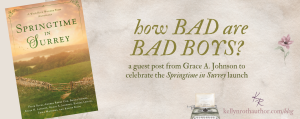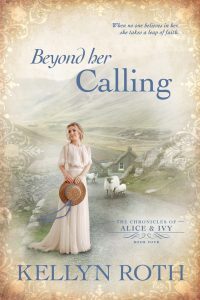How Bad Are Bad Boys? | Guest Post from Grace A. Johnson of the Springtime in Surrey Anthology (Wild Blue Wonder Press)

Hey folks! Today I’m sharing a blog post from Grace A. Johnson, one of the authors from Wild Blue Wonder Press’s first ever anthology, Springtime in Surrey.
If you don’t remember, Springtime in Surrey is launching on July 25th and is available for preorder now!
Read this post if you have thoughts about writing romance from a Christian perspective … I love this post!

Christian romance is obsessed with bad boys—but at what point does the obsession become unhealthy?
You might not realize it, but it’s a very important question. Kellyn recently touched upon it in her Instagram stories, and her thoughts ignited my passion for this topic, which I first addressed in this book review on my blog.
From rough-and-tumble cowboys who fancy one of the girls down at the saloon to roguish pirates who’ve pilfered their share of ladies’ hearts to leather-clad bikers with mysterious pasts, romance—even Christian romance—is chock-full of bad boys. And lemme tell y’all, there’s something about those charming, sexy (Kell’s words, not mine) rakes and bad boys who know just what to say to make the heroine swoon and just how to kiss to make the scene explode with fireworks.
And watching that wanderin’ man give up his old life to commit to one girl, well, it makes even us readers feel mighty special. After all, who doesn’t want to know that they’re worth giving up every other person to be with?
But (there’s always a but in ranting articles), far too many books glamorize the life of an experienced man. Striking a balance between sexy and realistic often proves difficult, which raises the question…how bad are bad boys, really?
MOTIVES MATTER
I love how Kell put it—experience = sex appeal. Why settle for a forty-year-old virgin when you could have a young, roaming, virile man who knows what he’s about? Men just seem sexier (at least fictional ones) when their hands don’t fumble and they don’t stumble over their words, am I right? (Make sure to read the rest of the post to find out why that is NOT right!)
When you give your hero a past full of womanizing for the sole purpose of making them seem sexy, BOY have you missed the mark. Not only is that shallow and unfair to your poor characters, it’s unrealistic and it actually sexualizes your characters and promotes sexual immorality. Your hero (or heroine) is NOT an object of lust for your readers (that’s when romance becomes porn, peeps) and your story should not exist to stir up sexual desires. 100%, your heroine should be attracted to the hero—but when you’re focused more on how the reader perceives the male love interest rather than how the heroine does, you’ve got the wrong motives.
And when you use sexual immorality like a trump card to up your game, you’re communicating to your readers that maybe it’s not so bad to date/marry a “wild man.” Maybe sleeping around is kinda hot. Maybe it’s more masculine to be with every woman that comes around.
That, my friends, is an ideal that’s been promoted by that secular world for y e a r s. And it would always result in damaged relationships, a warped worldview, and toxic masculinity. I hate to use that term, but it’s true. Masculinity, virility, and sex appeal is NOT determined by the number of women a man has bedded, kisses he’s stolen, or charming one-liners he has.
Just the opposite—but I’ll get to that later.
IT’S STILL A SIN
We live in a culture—even within the church—where sexual immorality is no longer viewed as a sin. I live in a small, conservative town in the Deep South…and it’s your most devout Baptists and Methodists and Pentecostals who let sexual immorality slide. Living with someone you’re not married to, sleeping around with every romantic partner, getting serious at a young age—no one bats an eye at it anymore. In some cases, it’s encouraged.
Unfortunately, Christian fiction sometimes falls into this same trap of ignoring the true nature of premarital/extramarital sex.
No matter how “sexy” it may seem…it’s still a sin.
“For this is the will of God, your sanctification: that you abstain from sexual immorality; that each one of you know how to control his own body in holiness and honor, not in the passion of lust like the Gentiles who do not know God.”
1 Thessalonians 4:3-5 ESV
“Let marriage be held in honor among all, and let the marriage bed be undefiled, for God will judge the sexually immoral and adulterous.”
Hebrews 13:4 ESV
So should you avoid it entirely? Never read or write about bad boys again? Have every character be as pure as the newly fallen snow?
Heck no! That’s insanely unrealistic and ain’t gonna help readers grapple with the tough aspects of our crazy society. But if you’re a Christian author, whether you write Christian fiction or not, you should promote a biblical worldview. And whether you read Christian fiction or secular fiction, you should be mindful of what you read and seek out books that don’t discourage your convictions and beliefs but build them up.
So what does that look like?
1) Recognizing it’s a harmful sin.
Womanizing results in fragile trust, broken relationships, and sexual trauma. Imagine discovering your husband had slept with another woman (or several) before you. How would you feel? You’d constantly be watching to see if his eye wanders, wondering if you measure up to the many women before, feeling like another conquest. Or imagine if you were the one with “experience.” You’d feel unworthy, dirty, or like you’re doing your spouse an injustice.
So make these truths clear in your story.
2) Repentant characters.
A confident man can be appealing, but when that confidence becomes arrogance and prevents him from seeing the sin in his life, it’s toxic. He’ll continue in the same old unhealthy patterns if he doesn’t repent. He can vow to never leave the heroine and to love only her for the rest of his life…but without Christ and genuine repentance, those words are empty.
Instead of writing a hyper-confident, proud, selfish man, remember that your rake has to go on a journey of repentance and redemption to result in a lasting romance. Have him recognize the error of his ways, feel guilt and conviction, and turn away from his sin and to Christ.
3) Reaping consequences.
Sometimes, we think happily ever after means no grief, no heartache, no consequences. We want to brush things under the rug or sugarcoat them to satisfy readers…but readers won’t be truly satisfied if you don’t accept reality: that there’s consequences for sin. No, not every consequence is big and dramatic and changes the whole course of your life (or in this case, your story) … but maybe there will be a fight. A sleepless night. An uneasy feeling. After living in such a dangerous way, your hero won’t be the same. He won’t be able to get away scot-free, without trauma or consequences. He can absolutely receive grace and mercy, but not without discipline and correction—and the plain and simple cause-and-effect of sinful behavior.
When you take the time to emphasize the destructiveness of sexual immorality and its status as a sin, your hero’s redemption story will be a thousand times more meaningful. His love story with the heroine will be a thousand times more beautiful and true. Sugarcoating only leaves your story feeling shallow and bitter rather than full and sweet.
GIVE THEM BAD BOYS GOOD QUALITIES
When I first started writing my cutthroat pirate heroine, I was so concerned that she would be too violent and cruel to be the object of a loving relationship—so I knew I had to give her redeeming qualities. Her arrogance and physical capabilities weren’t going to get her far when it came to selflessly devoting her life to another.
The same goes for bad boys. We see experience and charm and sex appeal as the hero’s #1 strength and best quality. We’ll go on and on about his good looks and sweet words and swoon-worthy kisses, as if that’s all that matters.
There’s absolutely worth in words of affirmation and well-formed features (whether we’re talking facial features or abs)…but those aren’t redeeming qualities. Being a bad boy simply isn’t good.
So don’t emphasize that as the main reason why your hero is the hero or why the heroine falls for him. I mentioned earlier that experience doesn’t equal masculinity.
Goodness of heart does.
A truly masculine man will protect women, not harm them. He’ll lead them into safety and peace, not astray. He’ll give of himself over and over for those in need, without getting anything in return. He’ll take charge in times of peril. He’ll care for children and the elderly. He’ll show respect and chivalry, even to those who probably don’t deserve it.
So even if your hero had a rough past with a boatload of mistakes or he’s beginning his journey to redemption, his #1 character trait doesn’t have to be his sin. In fact, it’s not. We as people shouldn’t be defined by our sin—not when we’re saved. Instead of being a liar or a cheater, we’re beloved by God and free. Instead of your hero being a lover boy, he can be intelligent, compassionate, generous, self-sacrificing, or humble. Give him some good qualities, and praise those over his destructive lifestyle.
BE TACTFUL

*author insert*
I’ve gotta shout out to my lovely host, Kell. Her hero Jordy (gosh, I hope this isn’t spoilers) has a past of sexual immorality. It would be sooo easy for him to show up in the story sweet-talking our heroine, making eyes at her, giving her those warm fuzzies. He could’ve been the charming kind of guy that opened innocent little Ivy to new experiences and challenged the way she saw the world. Kell could have gone on and on about how suave he was or how sexy because of his past.
But she didn’t.
She treated his sin like sin, she emphasized his good qualities over his experience, and she was tactful about it.
How many times do we treat sex like a joke? Like something to laugh or be graphic about? Even as Christians, we make crude comments or take sex lightly—and that comes through in fiction. There’s often no tact or filter, no grace in how topics like this are dealt with. Even in sweet or saintly romance (see this post for reference), writers will infer sexual pasts, but only in the vaguest terms possible—and even this isn’t quite tasteful.
We need to be open and honest in a way that convictions but doesn’t confuse. Provokes serious thought rather than jokes. And I say this as someone who’s more likely to joke to herself than actually consider things with the weight they deserve.
Don’t let that bleed into what you write or read. Bad boys aren’t a laughing matter, but they should be portrayed truthfully, prayerfully, and gracefully. Your motives shouldn’t be to give your hero sex appeal, but to powerfully impact your reader with the truth—about God’s redeeming love, the damage sin causes, and the beauty of sex within a loving marriage.
Taking bad boys lightly cheapens sex, not only for your story when your hero and heroine are married, but for your readers too. Sex has a unique and amazing purpose that nothing else on this earth does, so don’t distort your readers’ view of it by misrepresenting it in your stories.
And if you as a reader are consuming media that doesn’t treat sex with grace and honesty, read the Word instead. See what God has to say about what people ignore, joke about, or flaunt.
THERE WE HAVE IT, FOLKS
I think I’m done ranting now. The summary for you skimmers (don’t worry, it takes one to know one): bad boys can easily be, well, bad…but there’s a way to write them right. There’s a way to view them as an author and reader (or viewer or listener) that promotes healthy relationships, a biblical understanding of sex, and a holy way of life.
We shouldn’t swear off sinful characters, just like we can’t swear off sinful people in real life…but that doesn’t mean we shouldn’t take the time to portray sin biblically. Even those “sexy” bad boys.
So…what do you think? Do you have a heart for bad boys and redemption arcs, or do you prefer good guys who give prime examples of godly men? Who are some of your favorite bad boy characters in fiction, and why? How did those authors portray their character? I’d love to hear all about it in the comments!
And thank you so much to Kell for having me on! It’s always a pleasure to rant on her blog!

 Grace A. Johnson is a Christian fiction authoress, book reviewer, and avid reader. She lives in beautiful (but humid) South Georgia, surrounded by farmland and forestry, with her parents and six younger siblings. She has indie-published the first three novels in a Christian historical romance series, the Daughters of the Seven Seas, and a smattering of short stories and novellas, as well as a devotional. She’s also a marketer and editor who loves helping young authors through her editing business S&J Editors and her small publishing company Sky’s the Limit Press. You can find her on Instagram and Facebook @graceajohnsonauthor or blogging on her website at www.graceajohnson.com. Join her for a virtual cup of tea and a free preview of her debut novel when you sign up for her e-newsletter!
Grace A. Johnson is a Christian fiction authoress, book reviewer, and avid reader. She lives in beautiful (but humid) South Georgia, surrounded by farmland and forestry, with her parents and six younger siblings. She has indie-published the first three novels in a Christian historical romance series, the Daughters of the Seven Seas, and a smattering of short stories and novellas, as well as a devotional. She’s also a marketer and editor who loves helping young authors through her editing business S&J Editors and her small publishing company Sky’s the Limit Press. You can find her on Instagram and Facebook @graceajohnsonauthor or blogging on her website at www.graceajohnson.com. Join her for a virtual cup of tea and a free preview of her debut novel when you sign up for her e-newsletter!
TTFN!
~Kell~
p.s.Do you agree or disagree? (Myself? Yeah, I agree.)
Don’t forget to preorder Springtime in Surrey now!

Are you interested in getting to know me & my books better?
I want to invite you to my super secret club. I mean, it’s not really a secret, because I’m telling you about it now, but here goes.
Join Mrs. Roth’s Society Column, my street team! We’d love to have you along for the ride!
Kellyn Roth, Author
Find the main blog at http://kellynrothauthor.com/blog ...more
- Kellyn Roth's profile
- 1126 followers



